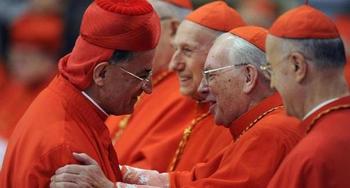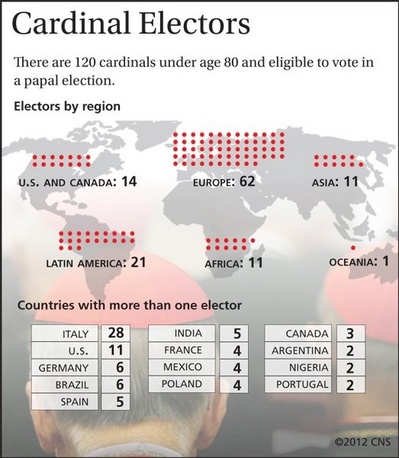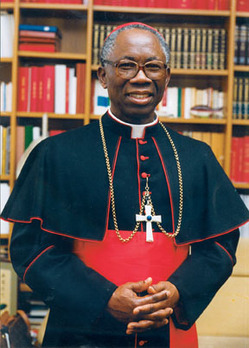Conversion advances the Kingdom of God. There is no possibility of entering the Kingdom prepared and promised to us without turning away from sin and truly walking on the path given by the Lord. AND this Kingdom is totally other than what we known and expect. And because of our baptism our vocation is to build the Kingdom according to a plan that is not our own. At the Mass offered by the Pope on the Solemnity of Our Lord Jesus Christ, King of the Universe, he did so with the six cardinals and their friends and family. The homily follows.
Today's Solemnity of Christ, King of the Universe, the crowning of the liturgical year, is enriched by our reception into the College of Cardinals of six new members whom, following tradition, I have invited to celebrate the Eucharist with me this morning. I greet each of them most cordially and I thank Cardinal James Michael Harvey for the gracious words which he addressed to me in the name of all. I greet the other Cardinals and Bishops present, as well as the distinguished civil Authorities, Ambassadors, priests, religious and all the faithful, especially those coming from the Dioceses entrusted to the pastoral care of the new Cardinals.In this final Sunday of the liturgical year, the Church invites us to celebrate the Lord Jesus as King of the Universe. She calls us to look to the future, or more properly into the depths, to the ultimate goal of history, which will be the definitive and eternal kingdom of Christ. He was with the Father in the beginning, when the world was created, and he will fully manifest his lordship at the end of time, when he will judge all mankind. Today's three readings speak to us of this kingdom. In the Gospel passage which we have just heard, drawn from the account of Saint John, Jesus appears in humiliating circumstances - he stands accused - before the might of Rome. He had been arrested, insulted, mocked, and now his enemies hope to obtain his condemnation to death by crucifixion. They had presented him to Pilate as one who sought political power, as the self-proclaimed King of the Jews. The Roman procurator conducts his enquiry and asks Jesus: "Are you the King of the Jews?" (Jn 18:33). In reply to this question, Jesus clarifies the nature of his kingship and his messiahship itself, which is no worldly power but a love which serves. He states that his kingdom is in no way to be confused with a political reign: "My kingship is not of this world ... is not from the world" (v. 36).







